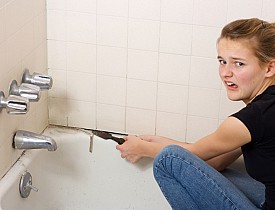Mold and Water Damage Remediation
 Water damage can happen in many ways: sump pump stops working, the roof leaks, drains get plugged, or water pipes break. Natural disasters such as storm surges and floods can also push water into places where it was never intended to be. Even if the water damage isn't obvious, water allowed to stand in dark places becomes a breeding ground for unwelcome molds and fungus.
Water damage can happen in many ways: sump pump stops working, the roof leaks, drains get plugged, or water pipes break. Natural disasters such as storm surges and floods can also push water into places where it was never intended to be. Even if the water damage isn't obvious, water allowed to stand in dark places becomes a breeding ground for unwelcome molds and fungus.
First Fix the Water Problem at its Root
Before remediation can begin, repair the problem. If the damage results from sump pump failure, be sure to check the breaker before installing a new pump. Leaky roofs might be a task better suited to a professional roofer than a weekend warrior. Whatever solution is best for you, repair the problem as quickly as possible.
Where Mold Grows in Houses
Porous materials, like wood, carpet, padding and drywall absorb and retain a surprising amount of water. Unchecked, fungal growth can occur within a few days of a moisture event. According to the Center for Disease Control "recent research indicates that common construction materials may contain mold spores when they arrive from distributors and that some of the spores will germinate if exposed to relative humidity (RH) of 95% for extended periods (22-60 days); if they are wetted with water, germination can occur in less than 5 days."
Molds are fungi that are lurk indoors and outdoors, just about everywhere. Known to sicken people or aggravate existing illnesses such as allergies and asthma, mold poses a significant health risk.
How to Prevent Fungal Growth in Your House
To prevent fungal growth, dry all wet materials quickly. These materials include carpet, carpet padding, trim, drywall and other wall coverings, furniture and subfloor. If you decide not to call professional cleaners, open all windows if it isn't raining. Remove all damaged flooring, trim and furniture. Either dry it thoroughly or replace it. Rent powerful dehumidifiers to pull moisture from the walls. Run fans to help dry all surfaces. Drywall may need to be replaced if it is damaged. While this can be a cumbersome undertaking, your home will retain its value if it does not have unhealthy mold as a deterrent.
Insurance companies may pay for the damage depending on what caused the problem. Check your policy to see if your damages are covered by your policy. The worst thing the owner of a water damaged property can do is ignore the problem and hope it goes away. Mold thrives in neglected environments.
Educated prospective home buyers will hire an inspector before buying a home. One of the things that will alert an inspector to potential hazards and damage is the presence of mold. Even if the home doesn't smell like mold or mildew, mold can still lurk in the dark crevices of a home. Ensure your home retains its value by swiftly and carefully repairing any water damage... and stop mold before it grows.
Looking for a Pro? Call us (866) 441-6648

Plumbing Average Costs
Plumbers Experiences

Rotted Fence Repair Taken Care Of Fast And Efficiently

My Deck Repair Was Simple But Perfect



